Ricky Skaggs. The National Stadium, Dublin, Ireland. May 1985.
It is – wow – thirty-five years ago today, May 18 1985, that Ricky Skaggs played the first of two gigs in London’s Dominion Theatre, the culmination of his first European tour as a bandleader (he had toured the UK previously as a member of the Emmylou Harris Hot Band). At the time Ricky was hot property, riding the crest of his 1980’s country success that quickly followed the 1981 signing of a major deal with Epic Records – through 1982 and early 1983 alone, during which he was made the youngest member of the Grand Ole Opry (on May 15, 1982), he had a string of five straight number one singles, two of which, ‘Crying My Heart Out Over You (Flatt & Scruggs) and ‘I Wouldn’t Change You If I Could’ (Jim Eanes), came from bluegrass sources. Largely responsible for the new traditionalist back-to-basics movement country music experienced at the time, here was a talented bluegrass tenor and multi-instrumentalist from Cordell in rural east Kentucky bringing rootsy traditional country back into the consciousness of a country audience at a time when pop music had invaded the land of rural rhythm – veteran producer Chet Atkins was famously said to have credited Ricky with single-handedly saving country music.
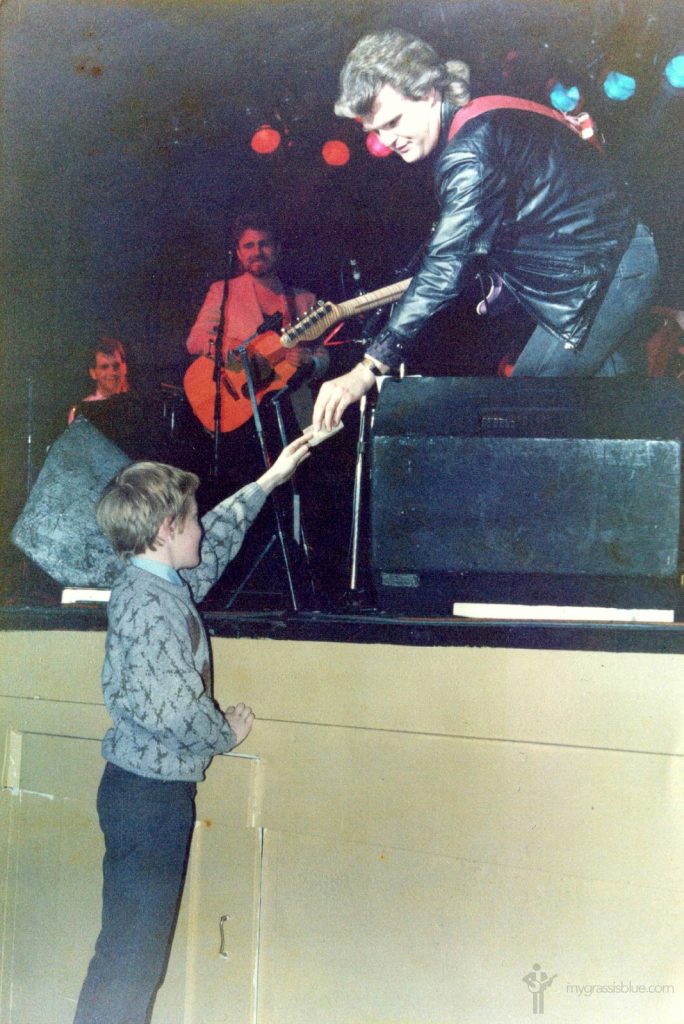
The National Stadium, Dublin, Ireland. Sometime in mid-May 1985.
Only a 9-year-old me would have the gumption to solicit Ricky’s attention mid-set during the Dublin leg of his 1985 European tour. I don’t remember much of the gig itself but I do remember this moment, immortalised in grainy print as captured by my Dad, Dave Snr (it’s the least he could have done having probably put me up to it). And 35 years on, neither of us have any idea what the written note I was passing to Ricky was requesting. An immaterial detail.
Information is hard to come by on the makeup of the 1985 European tour. It was a long time ago, before the internet and social media. Given that the two London shows were the culmination of the tour, it’s safe to assume the gigs in Edinburgh, Derby, Stockholm, Frankfurt, Rotterdam and Dublin came before them. Dates, including for the Dublin gig? I’ve no idea, and nor seemingly does Google (I’ve looked). The London dates, however, are well documented – both gigs were recorded for a forthcoming ‘Live in London’ LP.
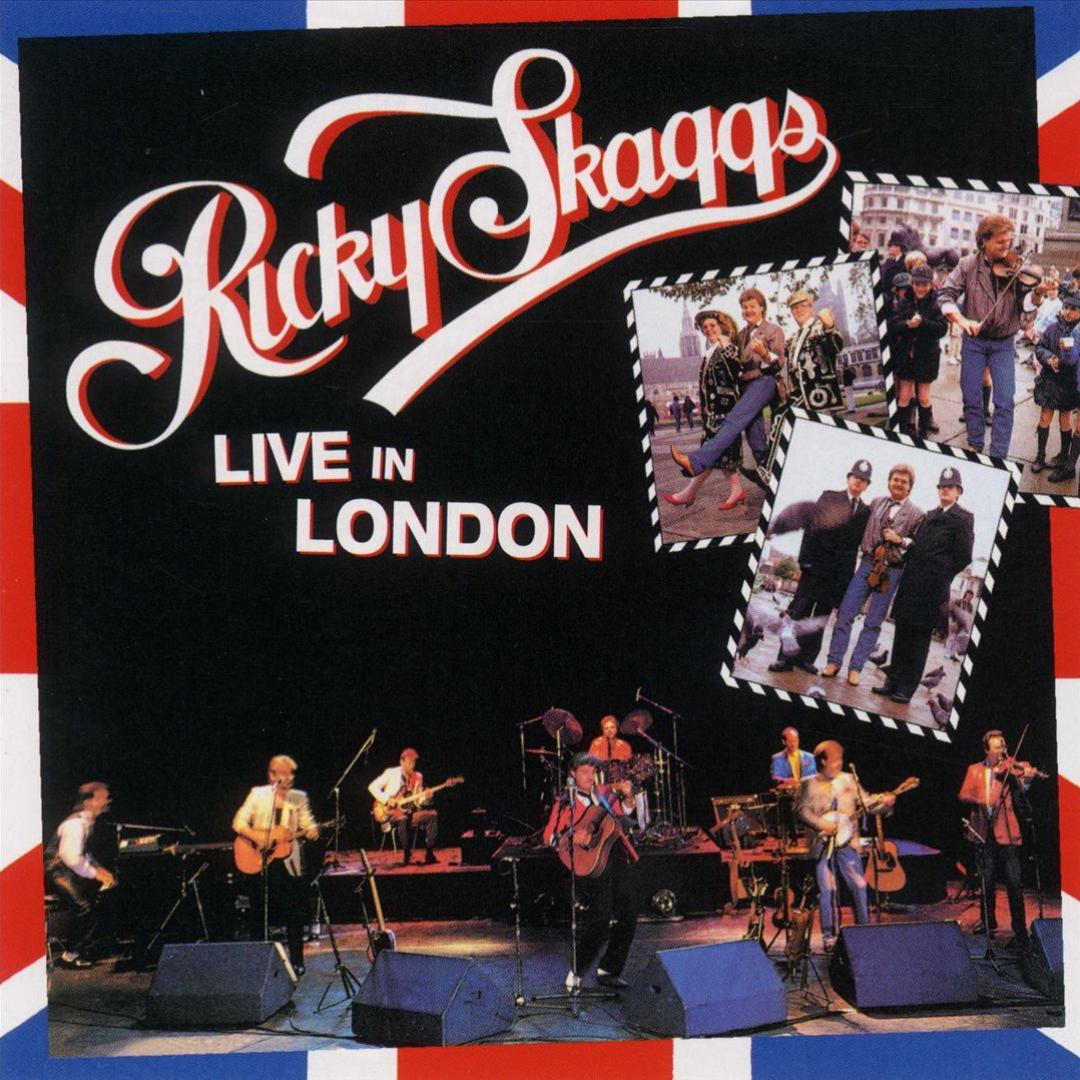
Ricky Skaggs Live in London was released in the US in early October 1985, some five months after its recording in London and around the same time that Ricky picked up Entertainer of the Year at the 20th Annual CMA Awards in Nashville (on October 14, 1985), the only time he would win the CMA’s top accolade – The Ricky Skaggs Band (“the boys in the band”) would also collect the CMA Instrumental Group of the Year award that year, the third straight year they would claim the award (these guys were peerless in 1985).
One of the first CDs I ever handled, and certainly the first recording of any kind to leave an indelible impression on me (there are very few recordings, of any genre, that would signify my youth as does this recording), I played this record until it almost refused to play again. I’m rediscovering it now as I type, reminded of the intro by Charles Haid; the barnstorming ‘Uncle Pen’ opener like you’ve never heard ‘Uncle Pen’ before (with drums and pedal steel); ‘Cajun Moon’ and the “alright, Ricky!” and “Country Boy!” shout-outs from the crowd; Gary Smith’s piano on ‘Country Boy’, and especially on ‘Rockin’ the Boat’; the crowd singalong to ‘Honey (Open That Door)’; and, of course, the closing duet with Elvis Costello of Flatt & Scruggs’ ‘Don’t Get Above Your Raising’, Ricky’s first single release on Epic from his 1981 Waitin’ for the Sun to Shine album. All memorable moments from a seminal album. Well, seminal for a then 9-year-old me at least.
– From Ricky Skaggs & Kentucky Thunder – Live at the Charleston Music Hall (2003, Skaggs Family Records)
The Return To The Bluegrass Promised Land
Sales declined in the latter half of the ’80s and beyond, Ricky’s traditional sound lost among the contemporary country sounds of the early 1990s and not hitting the same heights of a decade earlier. With the #countrymusic world conquered & nothing left to prove, #RickySkaggs went back to his #bluegrass roots in 1996, shortly followed by the formation of his own label, @SkaggsFmlyRcrds, in 1997. #bluegrasshistory He hasn’t looked back since.
Ricky Skaggs IBMA Hall of Fame Bio
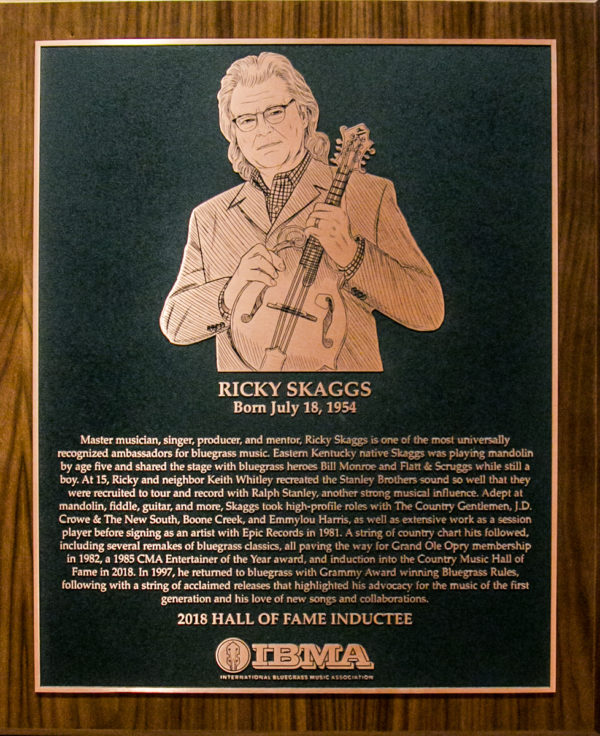 IBMA Hall of Fame Induction | 2018
IBMA Hall of Fame Induction | 2018Born | July 18, 1954 in Louisa, Kentucky
Primary Instrument | Mandolin
Ricky Skaggs has led a storied life in music that included childhood guest appearances with Bill Monroe, Flatt and Scruggs, and the Stanley Brothers; apprenticeships with Ralph Stanley and the Country Gentlemen; spots in classic configurations of bands headed by J.D. Crowe and Emmylou Harris; status as a mainstream country music star and finally as a headliner/elder statesman for bluegrass.
He was born into a musical family on July 18, 1954, in Louisa, Kentucky. His father, Hobert, played guitar and was a fan of bluegrass while his mother, Dorothy, enjoyed singing and composing songs. Mrs. Skaggs would oftentimes sing while doing chores around the house and Ricky, starting at age three, would sing harmony. Church provided another forum for hearing and singing music.
In the winter of 1959, Ricky received a mandolin as a gift from his father, who showed him his first three chords. Soon the pair was making music together and this evolved into a Skaggs Family band with appearances on WTCR radio in nearby Ashland, Kentucky. Highlights from this era included a 1961 band guest appearance on Ernest Tubb’s Midnight Jamboree in Nashville and solo spots by Ricky with Bill Monroe (1960), Flatt and Scruggs (1962) and his idols the Stanley Brothers (1963 and 1964).
By the middle 1960s, the British invasion had begun and even Ricky Skaggs in rural eastern Kentucky was not immune to its influence; for a time he flirted with electric guitar. But other changes were taking place. The family moved to Columbus, Ohio, where Hobert and Ricky, although underage, frequented the Astro Inn to see Earl Taylor perform. It was also during this period that Ricky began a several-year fascination with the fiddle. Probably the biggest and most long-lasting event from this period was his acceptance, at age thirteen, of Jesus Christ as his savior. In the early part of 1969, the Skaggs family moved back to eastern Kentucky. There a bevy of old-time musicians continued to inform young Ricky’s musical tastes.
A chance appearance at a 1970 talent show charted his destiny. It was there he met his musical soulmate: Keith Whitley, a young guitarist and singer who, like Ricky, was enthralled by the music of the Stanley Brothers. Keith and Ricky formed a group known as the Lonesome Mountain Boys. They secured a spot on radio station WGOH in Grayson, Kentucky. A short time later, they were discovered by Ralph Stanley when the duo was performing on stage to fill time for Stanley’s late arrival at a concert. In short order, they were making select appearances with Stanley and, upon graduation from high school in the spring of 1971, signed on full-time.
In their first year with Stanley, Keith and Ricky participated in several recording sessions, including the landmark album Cry From the Cross. Reviewer Walt Saunders noted in Bluegrass Unlimited, “Anyone who has seen these kids performing with Ralph knows what hair-raising sounds they are capable of, especially on the older Stanley songs.” The duo, along with their fathers, helped to construct the stage at Ralph’s annual Memorial Day bluegrass festival. The pair also recorded two albums of their own: Tribute to the Stanley Brothers and Second Generation Bluegrass.
Quoted in “Ricky Skaggs Reacts to the Death of His ‘Hero’ Ralph Stanley,” countryrebel.com, accessed August 18, 2018
After two and a half years with Ralph Stanley, Ricky relocated to the Virginia suburbs of Washington, D.C. His dalliance with a forty-hour-a-week non-musical job at Virginia Electric and Power Company was cut short when an offer came to join the Country Gentlemen on fiddle. In short order, he was in the studio with them recording an album for Vanguard. Proximity to the vibrant Washington bluegrass scene landed him numerous opportunities for session work, including the Seldom Scene’s Old Train (1974) and Tony Rice’s California Autumn (1975). He also released a solo album called That’s It (1975).
Toward the end of 1974, an offer came to join banjo player J.D. Crowe’s New South. That Lexington, Kentucky, band enjoyed steady club work, often consisting of four sets per evening. The opportunity gave Ricky the chance to broaden his repertoire and also hone his skills as a master of ceremonies. With Crowe, Ricky participated in one of the landmark bluegrass albums of all time, the self-titled J.D. Crowe and the New South (1975). Familiarly known by its Rounder Records catalog number, “0044,” it included guitarist Tony Rice, rising Dobro star Jerry Douglas, and long-time Crowe associate Bobby Slone on bass and fiddle.
By now a veteran sideman in three top bands, Ricky was ready to make his own mark. In 1975, he collaborated with Jerry Douglas, banjoist Terry Baucom, and guitarist/lead singer Wes Golding to form the contemporary bluegrass band Boone Creek. They released two albums: Boone Creek (1977) and One Way Track (1978).
In 1979, Emmylou Harris sought Ricky as a replacement for departing Rodney Crowell in her Hot Band. With Harris, Ricky gained working knowledge of a band with electric instruments. Straightaway, he was in the studio for her album Blue Kentucky Girl (1979). Subsequent projects included two acoustic/bluegrass-inflected albums: Light of the Stable (1979) and Roses in the Snow (1980). Ricky was responsible for adding several Stanley songs to Emmylou’s repertoire, notably “The Darkest Hour Is Just before Dawn.”
While working in the Hot Band, Ricky released a solo project on the Sugar Hill label: Sweet Temptation (1979). A fusion of traditional country music with tinges of bluegrass, it attracted the attention of several Nashville producers and landed Skaggs a spot at Epic Records. Coupled with a year of maternity leave for Emmylou Harris, this opportunity led to the launch of Ricky’s solo country career.
Quoted by Brit Greenquist in “Ricky Skaggs: The Keeper of Bluegrass,” www.tedxnashville.com, posted November 24, 2017
A string of singles and albums for Epic shot up the charts at the height of country’s neotraditional movement, a radical departure from the pop-inflected styles of the late 1970s. The albums Waiting For the Sun to Shine (1981), Highways and Heartaches (1982), and Don’t Cheat in Our Home Town (1983) contained chart-topping singles and enjoyed sales in the hundreds of thousands. Four of Ricky Skaggs’ #1 singles came from bluegrass sources: “Crying My Heart Out Over You” (Flatt and Scruggs), “I Wouldn’t Change You If I Could” (Jim Eanes), “Don’t Cheat in Our Home Town” (Stanley Brothers), and “Uncle Pen” (Bill Monroe).
With massive airplay and status as a concert headliner, Ricky received numerous awards and accolades. These included, from the Country Music Association: Horizon Award and Male Vocalist of the Year (1982), Instrumental Group of the Year (1982, 1983, 1985), and Entertainer of the Year (1985). Veteran producer Chet Atkins was said to have credited Ricky with single-handedly saving country music.
By the middle 1990s, a host of younger new traditionalists had grabbed the spotlight. With nothing new to prove in the country field, Ricky made the bold move to return to his acoustic/bluegrass roots. He christened his new band Kentucky Thunder. Their first album, Bluegrass Rules! (1997), sold over 200,000 copies and proved that bluegrass was still a viable commercial product. International Bluegrass Music Association awards have since included Album of the Year (1998), Instrumental Group of the Year (1998, 1999, 2000, 2002, 2003, 2004, 2005, 2006), Recorded Event of the Year (2000, 2008), Instrumental Album of the Year (2000), and Gospel Recorded Performance (2012).
Quoted by Bill Conger in “Ricky Skaggs–Stays True to Himself with Music to My Ears,” Bluegrass Unlimited, May 2013
In an effort to take more control over the production and promotion of his music, Ricky formed Skaggs Family Records in 1997. In addition to his own music, albums by Blue Highway, Cadillac Sky, the Cherryholmes, Mountain Heart, the Whites, and Del McCoury also appeared on the label. Ricky’s gospel album, Soldier of the Cross (1999) garnered a Grammy for Best Southern, Country or Bluegrass Gospel Album. In all, Ricky has received 15 Grammys and 29 nominations.
A recent career highlight was Ricky’s acquisition of the Gibson Lloyd Loar F-5 mandolin that was once owned by Pee Wee Lambert, the high harmony singer who helped to create the early Stanley Brothers sound. In a sense, Ricky’s music has come full circle. His 1996 deathbed promise to Bill Monroe was, “I will play this music as long as I live. Don’t worry about it. It’s in good hands.”
– Reproduced from the Ricky Skaggs entry on the Hall of Fame Inductees page of the Bluegrass Music Hall of Fame & Museum website
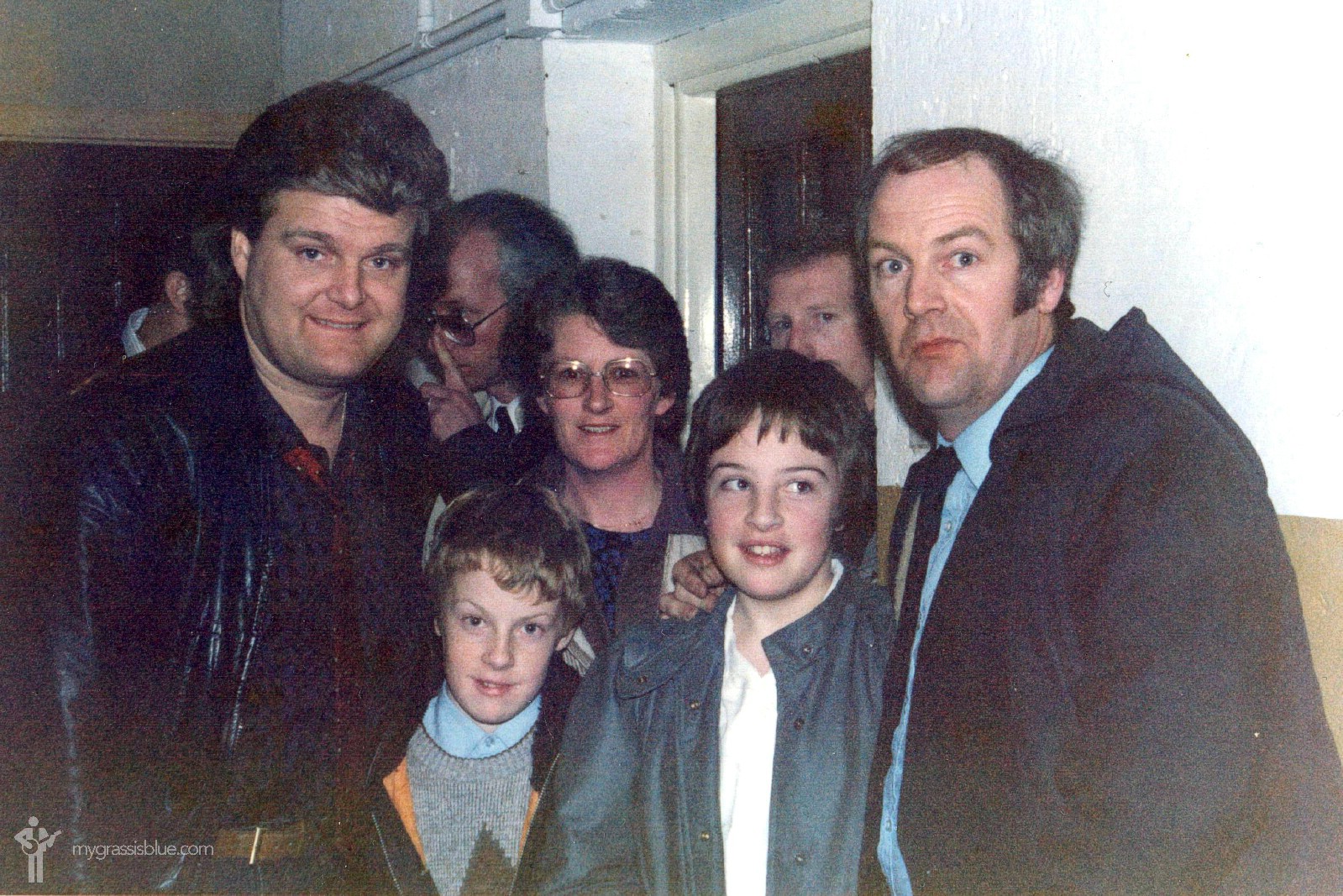
Back to the National Stadium, Dublin. Sometime in mid-May 1985.
Backstage after the gig. Myself, Siobhán and Dad, three-quarters of the present-day mygrassisblue.com crew (Mam, centre, has since passed and Lorraine wasn’t yet born). Again I don’t remember a whole lot, but Ricky doesn’t seem too upset with us for the earlier gig interruption.


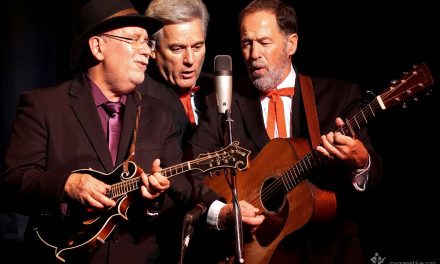
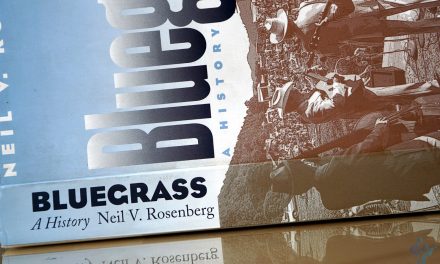
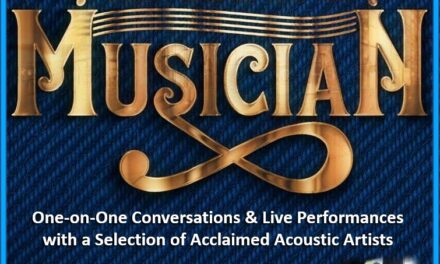
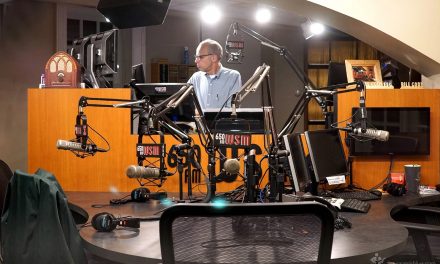

A good story from a great singer. I also met Ricky in May 1985 in his concert in Frankfurt , Germany. It was a great concert with all his hits . After the show Ricky gave an autograph sesson and invited me to the Fan Fair week in Nashville ,TN in June 1985. That was a big celebration for me , especially Rickys live concert and the picnic at the Marriott hotel in Nashville. I ve been in his fanclub from 1985 to today.
Frank Meyer
Bremerhaven , Germany